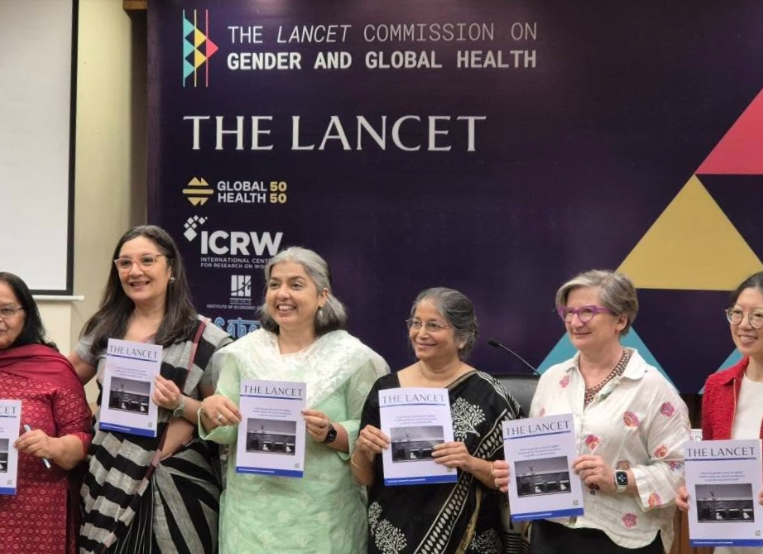Without Gender Justice, Health Equity Is Impossible, Global Health Commission Warns
Experts have called for urgent action to integrate gender equality and health equity efforts, warning that without unified strategies, progress on both fronts will continue to falter. This came during the launch of The Lancet Commission on Gender and Global Health report in Delhi, India, in April 2025, a landmark study titled “Achieving Gender Justice for Global Health Equity.”
The report emphasizes that achieving gender justice in global health is not only about securing rights related to health and gender equality, but also about dismantling systemic drivers of discrimination and exclusion. Such transformation, experts say, is essential to improving health outcomes, reducing health inequities, and building inclusive global health systems.
Despite governments worldwide committing to Agenda 2030 and the UN Sustainable Development Goals (SDGs), progress remains off-track. “We are not on track to realise the right to health and gender equality,” said Dr. Tlaleng Mofokeng, United Nations Special Rapporteur on the Right to Health, during a SHE & Rights session. She stressed that governments must urgently bridge the gap between promises and action.
The report comes at a critical time, following the 69th United Nations Commission on the Status of Women (CSW69) and ahead of the 2025 UN High-Level Political Forum on Sustainable Development, where SDG3 (Good Health and Well-being) and SDG5 (Gender Equality) will be reviewed.
Indrani Gupta, Commissioner of The Lancet Commission and Head of the Health Policy Research Unit at India’s Institute of Economic Growth, pointed out three common misconceptions that have distorted gender interventions in health:
- Confusing gender with sex, despite the fact that while interconnected, they are distinct concepts.
- Limiting gender discussions only to women and girls, instead of seeing gender as a relational and societal construct.
- Underestimating gender’s influence beyond sexual and reproductive health, ignoring its impact across infectious diseases, non-communicable diseases, mental health, and injuries.
Gupta warned of a global wave of anti-gender movements threatening to erode these nuanced understandings, urging vigilance against regressive trends.
Prominent activist and writer Farah Naqvi argued that although the International Conference on Population and Development (ICPD) 1994 and the Beijing Declaration 1995 popularized the language of “gender equality,” true understanding remains shallow.
“Gender became synonymous with women, stripping it of deeper transformative meaning,” Naqvi said. She added that policies often equate gender diversity simply with increasing the number of women in institutions, rather than reimagining systems through a gender lens. True gender mainstreaming, she explained, requires structural change, not tokenism.
Naqvi also emphasized intersectionality, noting that identities such as caste, religion, and gender cannot be separated. She warned against viewing identities like “Dalit woman” or “Muslim woman” as simply woman plus another trait — they represent distinct lived experiences needing specific responses.
“The aim is not to intensify exclusion but to recognize unique realities and allow new knowledge to emerge,” she said.
Naqvi further criticized anti-gender rhetoric, particularly efforts that deny transgender identities by clinging to binary biological definitions. She cautioned that the backlash against so-called “gender ideology” is part of a larger conservative movement threatening hard-fought gender rights globally.
She also attacked societal glorification of motherhood, warning against nationalistic narratives that idolize women’s reproductive roles and pressure women into imposed motherhood. “This choiceless burden of motherhood must be challenged,” Naqvi asserted.
Dr. Zoya Ali Rizvi, Deputy Commissioner at India’s Ministry of Health and Family Welfare, emphasized the urgent need for gender-segregated data to craft tailored solutions rather than blanket policies.
“Disparities begin at birth and widen over time. One-size-fits-all policies will not work,” said Dr. Rizvi. She called for establishing gender-specific indicators in programmes, ensuring implementing agencies are accountable, and involving local communities — including marginalized genders — in health initiatives ranging from adolescent to mental health.
The Commission also highlighted the global weaponisation of gender, where gender issues are manipulated for political and commercial gain. The health sector, experts argue, must actively resist anti-gender narratives and counter the influence of industries that exploit harmful gender norms to promote health-damaging products like tobacco and alcohol.
The Commission’s report strongly advocates for adopting a feminist framework to achieve transformative global health governance. Unlike patriarchal models built on power and exclusion, a feminist health response emphasizes solidarity, care, equity, and social justice.
This means critically analyzing how gender shapes policies and society, and championing equitable and ecologically sustainable change.
As Shobha Shukla, founding Managing Editor of Citizen News Service and a key health justice advocate, concluded: “Only a feminist health response can truly deliver health and gender equality for all.”



